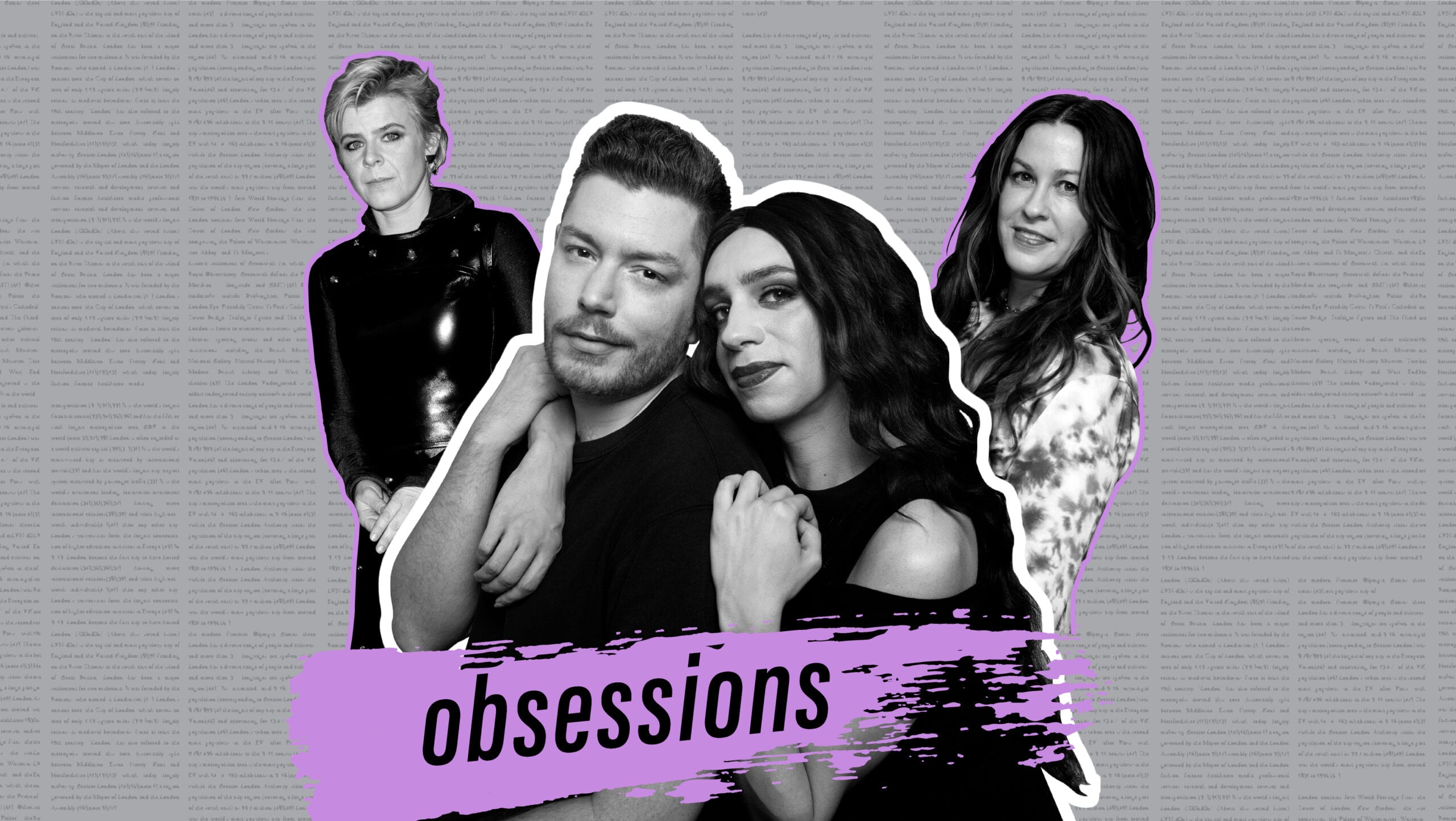Obsessions celebrates the pop culture fixations of queer, cosmically-destined BFFs Thomas Leblanc and Tranna Wintour, hosts of the CBC podcast Chosen Family.
beI hate to break it to you, but this spring—June 1 to be exact—Robyn’s “Dancing on My Own” turns 10.
Yup, it’s been a full decade since we first heard the pulsating opening bars, the heart-wrenching lyrics (“you’re far away, but still so near”) and the epic chorus with its “oh-ooh-ooooh” leading to the perfectly sing-alongable line “I keep dancing on my own.” (When she performs it live, Robyn often stops singing right before the chorus and lets the crowd take over.) The song connected because Robyn dared us to dance in the face of sadness and hurt and she affirmed that even when we ache, our bodies carry us through.
Now that physical distancing is being enforced for the foreseeable future, “Dancing on My Own” has taken on a new meaning. We are no longer dancing in a dark corner at the bar, watching from afar as an ex hits on a new prospect. We’re at home—many of us literally alone—connected only through video calls, Instagram Live dance parties like Club Quarantine and TikTok, with its challenges and viral dances (Robyn joined the platform this week). In a 2010 interview for Pitchfork, the Swede even said: “The whole album is about being lonely, but I think it’s interesting to put that idea into a club where a lot of people are crammed into a small room.” How prescient.
When “Dancing on My Own” came out in 2010, Robyn was not yet alt-pop royalty. At the time, pop nerds vaguely remembered her ‘90s hit “Show Me Love” or her tragically underrated 2005 offering “With Every Heartbeat.” “Dancing on My Own” not only made Robyn a global superstar, it helped shape the sound of pop for the following decade. But it wasn’t an overnight success. Its cult status built over time, thanks to queer people. We just love emotional baggage delivered through a thumping disco production (see: Madonna’s “Sorry” or ABBA’s “The Winner Takes it All”).
The song, along with Robyn’s three Body Talk mini-albums, are the most potent break-up pop music of the 21st century (closely beating Adele’s 21, in my opinion). “Dancing on My Own” became a hallmark of so many nights out, road trips, running playlists, dance parties and impromptu living room YouTube watch parties. It’s Gloria Gaynor’s “I Will Survive” for electro youth. As a part-time pop DJ, I have played it countless times in bars and at parties. Before the shutdown, it was hands down the most requested song during my sets.
But here’s the thing: Before we were all told to stay home, I was fed up with it. At my events, I joked that I wanted to put up a sign near the DJ booth with the words “NO ‘Dancing on My Own’.” I couldn’t stand how predictable the reaction to the song had become: As soon as the intro hit, the crowd would go wild. This isn’t Robyn’s fault; she can do no wrong. But there are so many other great Robyn songs—why can’t people get as excited for the rest of her catalogue?
And then there are the covers. I hated the Calum Scott version the first time I heard it because it was so bland and I resented that it became more commercially successful than the original. Kelly Clarkson obviously gave us the most Kelly Clarkson rendition. The Kings of Leon’s wasn’t bad, but I could never shake the feeling that these straight bros were taking the song away from us, the queers.
Then last weekend, openly gay Broadway star, internet hero and fierce vocalist Ben Platt offered his version. He’s sitting at a piano, launching his falsetto in the opening lines: “Somebody says you got a new friend, does she love you better than I can?”
saturday song #3 @robynkonichiwa ♥ pic.twitter.com/wijdxC7ejg
— Ben Platt (@BenSPLATT) April 4, 2020
Advertisement
It’s not that his version is so different or touching; it’s the moment that makes it unique. Most of us are at home, feeling powerless and hoping for the best while we watch the number of COVID-19 cases rise. In the face of the tragic mishandling of the crisis in many parts of the world, I’m glad that Platt can’t help but sing to make this moment feel a little more bearable.
After hearing Platt’s version, I began to miss hearing “Dancing on My Own” blasting on speakers at the bar. I miss the communal feeling of strangers and friends having a good time. I miss people and parties and being out at night. I miss live shows. So, I made a promise to myself: I will never take “Dancing on my Own” for granted.
I can’t wait for these lyrics to hold true again: “I’m just gonna dance all night, I’m all messed up, I’m so out of line.” Spring will come in the northern hemisphere and hopefully, when it’s safe for all of us to do so, we’ll dance and sing together again. Until then, I’ll keep dancing on my own.
— Thomas Leblanc

In these deeply challenging and disorienting days, I am trying to find comfort wherever I can. So many of the things that used to entertain me no longer do. I’m too preoccupied to read—I was enjoying Trust Exercise by Susan Choi before the world turned upside down. The last thing I want to watch right now is Sex and the City, a show that I have always turned to for distraction and escape but that now feels more unrelatable than ever. The Golden Girls, a show that has also been a touchstone, makes me miss my grandma who I haven’t been able to see for four weeks. But there is one artist who still brings me the same feeling of comfort, empathy and protection she has since I was eight years old: Alanis Morissette.
I don’t remember what drew eight-year-old me to Alanis, but I needed Jagged Little Pill. My mom caved and bought me the album on cassette. It was my first. I remember her asking the cashier at the record store, “Is this album okay for children?”
“Oh yeah,” he responded. “Your kid won’t understand what she’s singing about anyway.”
He wasn’t wrong. I didn’t know what wine-dine-69ing or going down on someone in a theatre meant. (I only just learned a few weeks ago that Alanis was singing “cross I bear” and not “cross-eyed bear” on “You Oughta Know.” All these years I was picturing Alanis fuming every time she caught sight of a haunting cross-eyed teddy bear, given to her by her awful ex.) But while I couldn’t understand the meaning of the lyrics, there was something in her evocative and honest voice that resonated so deeply for me that it created an unbreakable bond between us. We even kind of look alike and, as a kid, she was basically my big sister in my mind. I used to bring the Jagged Little Pill cassette booklet to school the way most kids brought toys. It was my security blanket. And in many ways it still is.
Many Alanis listeners jumped ship after “Thank U” from her criminally overlooked sophomore album, Supposed Former Infatuation Junkie, which I think is even better than Jagged Little Pill. I, however, have remained a true and loyal fan and genuinely love all the albums she’s released since (now is a great time to catch up on the Alanis you missed out on).
There is one song from Supposed Former Infatuation Junkie that I return to in my most challenging moments: “That I Would Be Good.” There is something sacred about how it holds so much power in its vulnerability. In a show I wrote and produced last year called Dear Alanis: A So-Called Musical Comedy, I performed a cover version of “That I Would Be Good,” and every time I sang it, I cried. It brought all my fears to the surface and allowed me to temporarily release them.
The lyrics are written in the style of a mantra and now it’s become my mantra for this moment:
That I would be good even if I did nothing
That I would be good if I got and stayed sick
That I would be good even if I gained ten pounds
That I would be fine even if I went bankrupt
That I would be good if I lost my hair and my youth
That I would be grand if I was not all-knowing
That I would be loved even when I numb myself
That I would be good even when I am overwhelmed
That I would be good even if I lost sanity
That I would be good
Whether with or without you
Many of us, myself included, have lost our jobs and the places where we share our art. Many of us are so overwhelmed that the simplest task feels monumental. Many of us live alone and wonder how this isolation will affect our mental health. Many of us are wondering who we are without the contact of our loved ones. This song is a reminder to me that we are all more than any of it: That simply by being we are enough. We are good and we will remain good and worthy regardless of what we may lose.
It’s been eight years since Alanis’s last album. A new one, Such Pretty Forks in the Road (the most Alanis title ever!), is set to be released in May. It features the brilliant “Reasons I Drink.” I’ve been aching for new Alanis all these years and in a strange way, it’s fitting that her return is happening at a time when I—we—need her the most.
— Tranna Wintour
On Apr. 16 at 8 p.m. EST, Tranna Wintour will be live streaming an at-home version of Dear Alanis as part of the National Arts Centre’s #CanadaPerforms series. Watch at https://www.facebook.com/CanadasNAC.CNAduCanada.



 Why you can trust Xtra
Why you can trust Xtra


